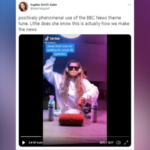Should musicians be praised solely for their vocals and melody even if their lyrics are tone-deaf?
Twitter user @kandreamt recently brought up Moira Dela Torre’s infamous ‘Titibo-tibo’, sparking discourse on LGBTQ+ representation in OPM. Despite the controversy surrounding the song, fans are continuing to defend the singer on the basis that the lyrics were inspired by someone’s real experience. However, many have argued that it doesn’t take away the fact that its message supports toxic heteronormative ideals that harm the gay community.
While it has been 3 years since its release, it seems like a lot of Filipinos still believe that it’s not a big issue. When in fact, these anti-LGBTQ narratives continue to be present in contemporary OPM.
Titibo-tibo by Moira Dela Torre (2017)
Starting off with the title on its own — which roughly translates to “acting like a lesbian” — it already perpetuates idea that being gay is just a phase. The song follows the story of a girl who was never interested in typically feminine things, until she finds herself catching feelings for a boy.
One verse reads, “Hindi ko alam kung anong meron ka na sa akin ay nagpalambot nang bigla / Sinong mag-aakalang lalake pala ang bibihag sa tulad kong tigreng gala.”
‘Titibo-tibo’ reinforces the problematic belief that lesbian women can be “changed” if the right guy comes along. The lyrics invalidate their sexual identity and gender expression, while also upholding society’s unrealistic standards of how a woman is expected to act like.
“Isang halik mo lamang at ako ay tinatablan / At ang aking pagkababae ay nabubuhayan / Na para bang bulaklak na namumukadkad.”
What's up with her stans sldjxkxj stop saying she didn't wrote it and she only sang it. The fact that she still accepted to sing the song despite its lyrics says a lot already. I can be a fan of someone's work but i will never defend them if they evidently did wrong.
— . (@han4oun) February 6, 2021
Awit by Young Vito (2020)
A local rapper that goes by ‘Young Vito’ came under fire last year after posting a snippet of his song ‘Awit’ on Instagram. The artist was slammed for its transphobic message, but that didn’t stop him from releasing the song under Viva Records.
The lyrics go, “May nakilala ako sa bar kagabi / ang ganda niya pero parang may mali / Nung dumikit mayroon akong napansin / napakalupit awit may lawit.”
“Lawit” translates to something hanging — this line in particular contributes to the stigma that trans women aren’t real women because of what they have between their legs. The song paints them to be “less than” and predatory for “deceiving” men.
Maybe he’s just insecure because his beat isn’t even original and he just copied it from another producer on YouTube.
https://twitter.com/benyacult/status/1218015722170806272?s=20
This Guy’s In Love With You Pare by Parokya Ni Edgar (2002)
What you probably didn’t expect to see on this list is beloved rock band ‘Parokya Ni Edgar’, but even legends can be problematic. Their 2002 Himig Handog single depicts how the narrator is squeamish after finding out that his male best friend is gay, and has a crush on him.
The decent thing to do when confronted with a situation like this is to talk to them about it, right? Instead he resorts to avoiding his phone calls, missing school, and making excuses to not see his best friend.
“Di na ako makasagot ng telepono / Palagi niyang kinakausap ang parents ko / Kulang daw sa tulog at di na makakain / Bakit ba? di pa non inamin.”
The music video also feeds into stereotypes as it portrays the best friend to be extremely feminine, leaning into the “bakla” caricature. One scene even shows the main character being sexually harassed as his best friend squeezes his butt without consent — further perpetuating the harmful notion that gay men are predatory.
What makes this so dangerous is that these malicious messages hide behind catchy beats to make it onto charts. These songs give people the permission to carry on with their backwards ideals. It promotes an environment that normalizes and accepts these anti-LGBTQ statements.
OPM artists and fans alike need to do better to create a more inclusive space in the industry.
Other POP! stories you might like:
NCCA caught under scrutiny for insensitive ‘Nazi-style’ pose
Did this TikTok ‘influencer’ go too far for clout?
Restaurant community shames TikTok duo over viral ‘prank’
Celebrating 21 OPM songs turning 21 this year
Anti-bullying motivational speaker encouraged assistant to quit after learning he was gay



